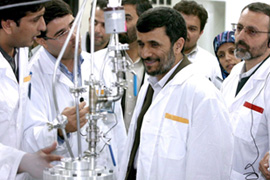Iran: No problem with nuclear plan
Ahmadinejad appears to change tack on plan to send uranium abroad for enrichment.

He dismissed concerns by “colleagues” that the West would not return the uranium, saying Iran would respond to that by continuing to produce its own enriched uranium.
“If they don’t return it, what will happen? We will be proven right, and then it will be proven that the agency [International Atomic Energy Agency, or IAEA] was not reliable and they will be discredited. Then we will be free to rely on ourselves for our activities.”
US response
The US has responded that Iran needs to inform the IAEA if it plans to go ahead with the deal and transfer its uranium abroad for enrichment.
“There is a forum to be able to resolve whether this is a serious offer and that’s through the IAEA. If Iran is serious, they can inform the IAEA that they are ready to accept the deal that’s on the table,” PJ Crowley, a US state department spokesman, said.
Western governments suspect Iran wants to make nuclear weapons but Iran says its nuclear programme is for civilian power generation.
The IAEA proposal would see about 70 per cent of Iran’s low-enriched uranium taken abroad, reducing the stockpile of material that could be enriched to a higher level and possibly be used to make nuclear weapons.
The uranium would be returned to Tehran about a year later as refined fuel rods, which can power reactors but cannot be readily turned into weapons-grade material.
Conservative opposition
The proposal was first drawn up in October by six countries – the US, Russia, China, Britain, France and Germany – and refined later that month in talks among Iran, the US, Russia and France.
 |
| Ahmadinejad said there was “no problem” sending uranium abroad for enrichment [EPA] |
But the deal stalled last year over disagreements about shipping and domestic resistance inside Iran.
Alireza Ronaghi, Al Jazeera’s correspondent in Tehran, said Iran’s apparent change of heart had come about after an easing of conservative opposition to the proposal.
“President Ahmadinejad has said …. Iran has the technology at its disposal to produce uranium enriched to the level that could be used as fuel, and now that Iran possesses that technology there is no problem in sending the uranium outside,” he said.
“The main problem was within Iran, where some conservatives were trying to lash out at the president because of his willingness to strike a deal with foreign powers, but after months of debate it seems like that obstacle has been removed.
“At the beginning there was a lot of fuss inside the parliament and elsewhere in the public domain about the government backing down against foreign powers, but little-by-little things have changed.”
Position unclear
However, it remains unclear how much of a concession or acceptance Ahmadinejad’s comments represent.
His timeframe of four or five months for the uranium processing overseas appears a long way off from the one year that Western officials say it would take for the process – a failure to bridge that difference could allow Iran to accuse the West of foot-dragging.
He also did not say whether Iran was ready to ship out most of its uranium stockpile in one batch – another condition of the proposal designed to delay Iran’s ability to make a nuclear weapon.
The US and its allies have been pushing for a fourth round of UN sanctions to be slapped on Iran for not complying with UN resolutions over its nuclear programme, but Russia and China are not in favour of any new penalties.
Possible prisoner swap
Meanwhile, Ahmadinejad suggested in the same interview that Iran would free three jailed US hikers in exchange for Iranians held in US prisons, adding that there are “some talk under way to have an exchange”.
The US responded cautiously, saying it had asked to meet the hikers, Shane Bauer, Sarah Shourd and Josh Fattal, currently held in Iran.
“If President Ahmadinejad’s comments suggest that they are prepared to grant us access through the Swiss and resolve the cases of the three hikers and other Americans in custody, we would welcome that step, Gordon Duguid, a state department spokesman, said.
The three were hiking in Iraq’s northern Kurdistan region in July when they accidentally crossed the border into Iran, their families said.